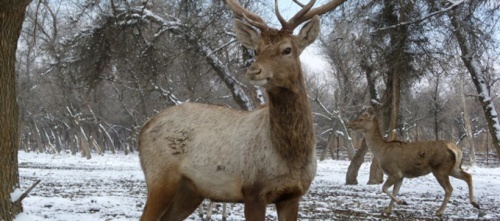
UN wildlife conference was venue to step up efforts to protect endangered species region including the Bukhara deer, the Bactrian camel and the Asiatic wild ass. UNEP (United Nations Environment Program) warned that environmental degradation is affecting people’s livelihoods multiplying its damaging economic and social impact in Central Asian countries. The Norway conference also focused on the conservation of the Bukhara deer – a species endemic to Central Asia – which had previously disappeared from forests due to uncontrolled hunting, logging and unsustainable agricultural practices. (Another similar effort has been undertaken in the Philippines -See Film Report: “International Year of Forests” -
diplomaticallyincorrect.org/films/movie/forests-international-year/24378). The Bukhara deer has been reintroduced to its old habitat through government conservation measures.
Vanishing Ecosystems:
Efforts more recently to protect the Bukhara deer have been successful; however the degradation of riparian forest ecosystems still represents a major threat to the long-term survival of the deer species. UNEP stressed that habitat degradation caused by climate change, overgrazing, natural disasters, and unsustainable irrigation systems among other factors are increasingly threatening other species such as wild camels, wild asses, antelopes, gazelles, sheep, goats, yaks and snow leopards. Infrastructure projects linked to exploitation of oil, gas and mineral reserves also threaten migratory species as they divide important habitats and create barriers for animals whose populations are split into smaller groups, exposing them to a higher risk of extinction. Read: -Saving Wildlife Pathways” -
diplomaticallyincorrect.org/films/blog_post/saving-wildlife-pathways-by-ambassador-mo/41969
Income Producing Alternatives as Alternatives to Over-Exploitation or Eco-sytem Abuse:
Governments agreed on the development of a new UNEP-backed action plan to protect endangered species. Under the plan, wildlife agencies and park rangers will be trained and strengthened, and economic incentives will be provided to encourage people to manage natural resources responsibly. Controlled hunting and eco-tourism (See Film Report: -“Eco-Travel Kenya” -
diplomaticallyincorrect.org/films/movie/eco-travel-kenya/28188 ), will be evaluated and hopefully encouraged as income producing alternatives. (See Film Report – “Wildlife in Conflict” -
diplomaticallyincorrect.org/films/movie/wildlife-in-conflict/28448). The plan, which falls under the Convention on the Conservation of Migratory Species of Wild Animals (CMS), also includes protecting the lowland riparian forests that can be found along the river basins of the Amudaria and Syrdaria, which are a critical habitat for the Bukhara deer. It also covers the Pamir and Tian Shan mountain ranges, home to the markhor sheep and the snow leopard, and bans poaching and illegal trade.
For More Information link to UNEP -
www.unep.org/newscentre/Default.aspx?DocumentID=2659&ArticleID=8954&l=en
By Ambassador Muhamed Sacirbey
Facebook Become a Fan – “Diplomatically Incorrect”
Twitter Follow us - DiplomaticallyX
More at Ecology-Diplomat -
diplomaticallyincorrect.org/c/ecology-diplomat/most_recent/1

